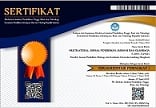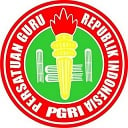Kegembiraan berolahraga dan kebugaran fisik peserta didik jenjang SD di kota Probolinggo
Abstract
Keywords
Full Text:
PDFReferences
Abadie, B. R. (1988). Construction and Validation of a Perceived Physical Fitness Scale. Perceptual and Motor Skills, 67(3), 887-892. https://doi.org/10.2466/pms.1988.67.3.887
Almli, C. R., Ball, R. H., & Wheeler, M. E. (2001). Human Fetal and Neonatal Movement Patterns: Gender Differences and Fetal-to-Neonatal Continuity. Developmental Psychobiology, 38(4), 252-273. https://doi.org/10.1002/dev.1019
Aswara, Y. (2020). Pembelajaran Kooperatif Berbasis Play and Games Aktivitass Kebugaran Jasmani (Pembelajaran Pendidikan Jasmani & Olahraga yang Aktif, Kreatif, Menyenangkan dan Berkarakter). IBU Press.
Azevedo, M. R., Araújo, C. L. P., Reichert, F. F., Siqueira, F. V., da Silva, M. C., & Hallal, P. C. (2007). Gender Differences in Leisure-Time Physical Activity. International Journal of Public Health, 52(1), 8-15. https://doi.org/10.1007/s00038-006-5062-1
Brustad, R. J. (2016). Affective Outcomes in Competitive Youth Sport: The Influence of Intrapersonal and Socialization Factors. Journal of Sport and Exercise Psychology, 10(3), 307–321. https://doi.org/10.1123/jsep.10.3.307
Covain, S., Baillieul, S., Nguyen, T. D., Guinot, M., Doutreleau, S., & Bricout, V. A. (2023). Gender Differences, Motor Skills and Physical Fitness Heterogeneity in Adults with Down’s Syndrome. Journal of Clinical Medicine, 12(4). https://doi.org/10.3390/jcm12041367
Dishman, R. K. (1988). Exercise Adherence: Its Impact on Public Health. In Journal of Sport & Exercise Psychology. Human Kinetics Books.
Dishman, R. K., Sallis, J. F., & Orenstein, D. R. (1985). The determinants of physical activity and exercise. Public Health Reports, 100(2), 158–171. https://pubmed.ncbi.nlm.nih.gov/3920714/
Fairclough, S., Hilland, T., Stratton, G., & Ridgers, N. (2012). “Am I Able? Is It Worth It?” Adolescent Girls’ Motivational Predispositions to School Physical Education: Associations with Health-Enhancing Physical Activity. European Physical Education Review, 18(2), 147–158. https://doi.org/10.1177/1356336X12440025
Filanti, V. M., Aswara, A. Y., & Purnomo, D. (2023). Physical Activity and Physical Fitness of Malang Raya Teenagers (Comparative Study Based on Urbanity , Gender and School Type). 29, 165–174.
Firtanto, A. D., & Maksum, A. (2021). Pola Aktivitas Fisik Siswa SMP pada Masa Pandemi Covid-19. JPOK: Jurnal Pendidikan Olahraga dan Kesehatan, 10(1), 91-95. https://ejournal.unesa.ac.id/index.php/jurnal-pendidikan-jasmani/article/view/45154
Gill, D.L., Gross, J.B., & Huddleston, S. (1983). Participation motivation in youth sports. International Journal of Sport Psychology, 14, 1–14.
Guthold, R., Stevens, G. A., Riley, L. M., & Bull, F. C. (2020). Global Trends in Insufficient Physical Activity among Adolescents: A Pooled Analysis of 298 Population-Based Surveys with 1·6 Million Participants. The Lancet Child and Adolescent Health, 4(1), 23–35. https://doi.org/10.1016/S2352-4642(19)30323-2
Hallal, P. C., Andersen, L. B., Bull, F. C., Guthold, R., Haskell, W., Ekelund, U., Alkandari, J. R., Bauman, A. E., Blair, S. N., Brownson, R. C., Craig, C. L., Goenka, S., Heath, G. W., Inoue, S., Kahlmeier, S., Katzmarzyk, P. T., Kohl, H. W., Lambert, E. V., Lee, I. M., … Wells, J. C. (2012). Global Physical Activity Levels: Surveillance Progress, Pitfalls, and Prospects. The Lancet, 380(9838), 247–257. https://doi.org/10.1016/S0140-6736(12)60646-1
Hands, B., & Parker, H. (2016). Male and Female Differences in Health Benefits Derived from Physical Activity: Implications for Exercise Prescription. Journal of Womens Health, Issues and Care, 5(4). https://doi.org/10.4172/2325-9795.1000238
Huffman, M. K., Christ, S. L., Ferraro, K. F., Klenosky, D. B., Marceau, K., & Amireault, S. (2021). Questions to Measure Enjoyment of and Satisfaction With Physical Activity: Are They Appropriate for Use in an Older Population? Innovation in Aging, 5(4), 1–11. https://doi.org/10.1093/geroni/igab041
Izawa, K. P., Yamada, S., Oka, K., Watanabe, S., Omiya, K., Iijima, S., Hirano, Y., Kobayashi, T., Kasahara, Y., Samejima, H., & Osada, N. (2004). Long-Term Exercise Maintenance, Physical Activity, and Health-Related Quality of Life after Cardiac Rehabilitation. American Journal of Physical Medicine and Rehabilitation, 83(12), 884–892. https://doi.org/10.1097/01.PHM.0000143404.59050.11
Janssen, I. (2007). Physical Activity Guidelines for Children And Youth. Canadian Journal of Public Health. Revue Canadienne de Santé Publique, 98 Suppl 2(March). https://doi.org/10.2139/ssrn.2308560
Jiang, W., Luo, J., & Guan, H. (2021). Gender Difference in the Relationship of Physical Activity and Subjective Happiness Among Chinese University Students. Frontiers in Psychology, 12(December), 1–6. https://doi.org/10.3389/fpsyg.2021.800515
Kaplan, M. S., Newsom, J. T., McFarland, B. H., & Lu, L. (2001). Demographic and Psychosocial Correlates of Physical Activity in Late Life. American Journal of Preventive Medicine, 21(4), 306–312. https://doi.org/10.1016/S0749-3797(01)00364-6
Kemendiknas. (2003). Sistem Pendidikan Nasional. Undang-Undang Republik Indonesia.
Khuwaja, A. K., & Kadir, M. M. (2010). Gender Differences and Clustering Pattern of Behavioural Risk Factors for Chronic Non-Communicable Diseases: Community-Based Study from a Developing Country. Chronic Illness, 6(3), 163–170. https://doi.org/10.1177/1742395309352255
Kohl, H. W., Craig, C. L., Lambert, E. V., Inoue, S., Alkandari, J. R., Leetongin, G., Kahlmeier, S., Andersen, L. B., Bauman, A. E., Blair, S. N., Brownson, R. C., Bull, F. C., Ekelund, U., Goenka, S., Guthold, R., Hallal, P. C., Haskell, W. L., Heath, G. W., Katzmarzyk, P. T., … Wells, J. C. (2012). The Pandemic of Physical Inactivity: Global Action for Public Health. The Lancet, 380(9838), 294–305. https://doi.org/10.1016/S0140-6736(12)60898-8
Koran Sindo. (2022). No Title. Kebugaran Orang Indonesia Rendah, Retrieved June 20, 2022.
Kristiana, Y., Lani, A., & Aswara, A. Y. (2023). Budaya Berolahraga Anak Usia Sekolah Dasar di Jawa Timur: Studi Eksplorasi Berdasarkan Gender dan Kegiatan Waktu Luang. Jurnal Ilmiah Mandala Education, 9(1), 582–589. https://doi.org/10.58258/jime.v9i1.4694
Kuswanto, E., Sucipto, A., & Sunuyeko, N. (2023). Gender, Barriers to Sport Partisipation and Physical Activity of Indonesia Junior High School Students. Paradigma: Jurnal Filsafat, Sains, Teknologi, dan Sosial Budaya, 29(1), 157-164.
Lim, K., & Taylor, L. (2005). Factors Associated with Physical Activity among Older People - a Population-Based Study. Preventive Medicine, 40(1), 33-40. https://doi.org/10.1016/j.ypmed.2004.04.046
Liu, X., Zhang, D., Liu, Y., Sun, X., Han, C., Wang, B., Ren, Y., Zhou, J., Zhao, Y., Shi, Y., Hu, D., & Zhang, M. (2017). Dose-Response Association between Physical Activity and Incident Hypertension: A Systematic Review and Meta-Analysis of Cohort Studies. Hypertension, 69(5), 813–820. https://doi.org/10.1161/hypertensionaha.116.08994
Lloyd-Jones, D. M., Hong, Y., Labarthe, D., Mozaffarian, D., Appel, L. J., Van Horn, L., Greenlund, K., Daniels, S., Nichol, G., Tomaselli, G. F., Arnett, D. K., Fonarow, G. C., Ho, P. M., Lauer, M. S., Masoudi, F. A., Robertson, R. M., Roger, V., Schwamm, L. H., Sorlie, P., … Rosamond, W. D. (2010). Defining and Setting National Goals for Cardiovascular Health Promotion and Disease Reduction: The American Heart Association’s Strategic Impact Goal Through 2020 and Beyond. Circulation, 121(4), 586–613. https://doi.org/10.1161/circulationaha.109.192703
Mao, H. Y., Hsu, H. C., & Lee, S. Da. (2020). Gender Differences in Related Influential Factors of Regular Exercise Behavior among People in Taiwan in 2007: A Cross-Sectional Study. PLoS ONE, 15(1), 1–13. https://doi.org/10.1371/journal.pone.0228191
Mashud, M. (2018). Analisis Masalah Guru PJOK dalam Mewujudkan Tujuan Kebugaran Jasmani. Multilateral Jurnal Pendidikan Jasmani Olahraga, 17(2), 77–85. https://doi.org/10.20527/multilateral.v17i2.5704
Mhatre V. Ho, Ji-Ann Lee, and K. C. M., & Dien et al., 2013. (2009). Measuring Enjoyment of Physical Activity in Children: Validation of the Physical Activity Enjoyment Scale. Bone, 23(1), 1–7. https://doi.org/10.1080/10413200802593612
Momenan, A. A., Delshad, M., Mirmiran, P., Ghanbarian, A., & Azizi, F. (2011). Leisure Time Physical Activity and its Determinants among Adults in Tehran: Tehran Lipid and Glucose Study. International Journal of Preventive Medicine, 2(4), 243–251.
Mutohir, C. T., & Maksum, A. (2007). Sport Development Index: Konsep, Metodologi dan Aplikasi. PT Index.
Parekh, N., Lin, Y., Craft, L. L., Vadiveloo, M., & Lu-Yao, G. L. (2012). Longitudinal Associations of Leisure-Time Physical Activity and Cancer Mortality in The Third National Health And Nutrition Examination Survey (1986-2006). Journal of Obesity, 2012, 1988–1994. https://doi.org/10.1155/2012/518358
Rustiadi, T., Rahayu, T., & Hadi. (2021). Kebugaran Jasmani Siswa Putra Kelas XII Sekolah Menengah Kejuruan (SMK) di Kabupaten Brebes di Masa Pandemi Covid-19. Prosiding Seminar Nasional LPTK CUP XX Tahun 2021 Fakultas Ilmu Keolahragaan, Universitas Negeri Jakarta, Indonesia Mewujudkan Insan Olahraga yang Inovatif, Unggul, dan Berkarakter Menuju Persaingan Global, 4(1), 4-13. https://journal.unj.ac.id/unj/index.php/prosidingfik/article/view/27525/12825
Salles-Costa, R., Heilborn, M. L., Werneck, G. L., Faerstein, E., & Lopes, C. S. (2003). Gender and leisure-time physical activity. Cadernos de Saúde Pública / Ministério Da Saúde, Fundação Oswaldo Cruz, Escola Nacional de Saúde Pública, 19 Suppl 2, 325-333. https://doi.org/10.1590/s0102-311x2003000800014
Santrock, J. W. (2012). Adolescence. NY: McGraw-Hill.
Sari, A. P., Aswara, A. Y., & Bekti, S. (2023). Budaya Berolahraga Anak Jawa Timur: Studi Kontrastif Berdasarkan Urbanitas dan Jenis Sekolah. Jurnal Ilmiah Mandala Education, 9(1), 543–548. https://doi.org/10.58258/jime.v9i1.4695
Silva, K. S., Barbosa Filho, V. C., Del Duca, G. F., de Anselmo Peres, M. A., Mota, J., Lopes, A. da S., & Nahas, M. V. (2014). Gender Differences in the Clustering Patterns of Risk Behaviours Associated with Non-Communicable Diseases in Brazilian Adolescents. Preventive Medicine, 65, 77–81. https://doi.org/10.1016/j.ypmed.2014.04.024
Stringhini, S., Carmeli, C., Jokela, M., Avendaño, M., Muennig, P., Guida, F., Ricceri, F., D’Errico, A., Barros, H., Bochud, M., Chadeau-Hyam, M., Clavel-Chapelon, F., Costa, G., Delpierre, C., Fraga, S., Goldberg, M., Giles, G. G., Krogh, V., Kelly-Irving, M., … Tumino, R. (2017). Socioeconomic Status and The 25 × 25 Risk Factors as Determinants of Premature Mortality: A Multicohort Study and Meta-Analysis of 1·7 Million Men and Women. The Lancet, 389(10075), 1229–1237. https://doi.org/10.1016/S0140-6736(16)32380-7
Strong, W. B., Malina, R. M., Blimkie, C. J. R., Daniels, S. R., Dishman, R. K., Gutin, B., Hergenroeder, A. C., Must, A., Nixon, P. A., Pivarnik, J. M., Rowland, T., Trost, S., & Trudeau, F. (2005). Evidence Based Physical Activity for School-Age Youth. Journal of Pediatrics, 146(6), 732-737. https://doi.org/10.1016/j.jpeds.2005.01.055
Suhandoko, E., Aswara, A. Y., & Bekti, S. (2023). Physical Activity and Physical Activity Enjoyment in Junior High School. Paradigma: Jurnal Filsafat, Sains, Teknologi, dan Sosial Budaya, 29(1), 136-145.
Sun, F., Norman, I. J., & While, A. E. (2013). Physical Activity in Older People: a Systematic Review. BMC Public Health, 13(1). https://doi.org/10.1186/1471-2458-13-449
Susilo, S., Aswara, A. Y., & Bekti, S. (2022). Gender Differences in Physical Fitness and Personal Ressilience in Vovational Students Indonesia. Paradigma: Jurnal Filsafat, Sains, Teknologi, dan Sosial Budaya, 28(November), 141–151.
Trost, S. G., Pate, R. R., Sallis, J. F., Freedson, P. S., Taylor, W. C., Dowda, M., & Sirard, J. (2002). Age and Gender Differences In Objectively Measured Physical Activity In Youth. Medicine and Science in Sports and Exercise, 34(2), 350–355. https://doi.org/10.1097/00005768-200202000-00025
Wankel, L.M., & Berger, B. . (1991). The benefits of sport. In B. Driver, P. Brown, & G. Peterson (Eds.), The benefits of leisure. Venture Press.
WHO. (2020). Who Guidelines on Physical Activity and Sedentary Behaviour. World Health Organization.
DOI: http://dx.doi.org/10.20527/multilateral.v23i4.20943
Article Metrics
Abstract view : 21 timesPDF - 1 times
Refbacks
- There are currently no refbacks.
Copyright (c) 2025 Multilateral : Jurnal Pendidikan Jasmani dan Olahraga

This work is licensed under a Creative Commons Attribution-ShareAlike 4.0 International License.
Tools:
Indexed by:

Multilateral : Jurnal Pendidikan Jasmani dan Olahraga is licensed under a Creative Commons Attribution-ShareAlike 4.0 International License.

















